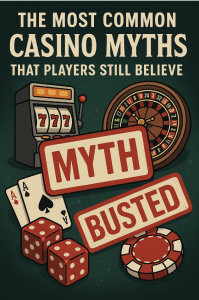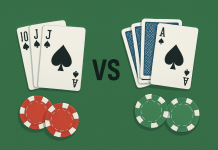The Most Common Casino Myths That Players Still Believe
Casinos have always been surrounded by myths and misconceptions. The most common casino myths have been around for decades. There’s the age-old belief that slot machines are “due” for a payout. Or that casinos manipulate the odds in games to ensure players always lose. And these casino myths have a strange effect on people’s mindsets toward gambling, influencing their actions and choices. Some misconceptions stem from misunderstandings of probability and the arbitrary nature of casino games. And others appear in Hollywood blockbusters like Ocean’s 11, 21 and classic movies like Casino.
In this article, we’ll debunk some of the most common casino myths at the core of player superstition over the years. And we’ll explain the reality behind them.
Myth #1: Card Counting Is Illegal
One of the most common casino myths is that card counting in blackjack is illegal. Most casinos won’t hesitate to kick you to the curb if they catch you card counting on the gaming floor. But, in reality, it’s not actually illegal or considered cheating. It’s just a strategy that skilled players use to gain an advantage over the house. And you don’t have to be mathematically gifted to do it either.
Quite simply, card counting involves tracking the ratio of high to low-value cards remaining in the deck. This allows players to adjust their bets accordingly. There is no law against using your brain to make strategic decisions in gambling. Nevertheless, casinos have the right to refuse service to anyone. That’s why casinos ban professional card counters once they’re discovered.
Myth #2: Slot Machines Pay Out More at Night

Many gamblers believe that casinos program slot machines to pay out more frequently at night, when casinos are busier. This myth suggests that casinos increase payouts to attract more players and create a winning atmosphere.
In reality, slot machines operate using random number generators (RNGs), ensuring that every spin is independent and unpredictable. Casinos do not adjust payouts based on the time of day. The idea that there are “hot” or “cold” periods for slot machines is simply a misunderstanding of randomness. The payout percentage of a machine occurs over millions of spins. External factors like time of day or the number of players in the casino don’t change this fact.
Myth #3: A Machine That Hasn’t Paid Out Is “Due” for a Win
The gambler’s fallacy is the belief that if something hasn’t happened in a while, it is more likely to occur soon. In slot machines, this manifests as the idea that a machine that hasn’t paid out in a long time is “due” for a big win.
However, each spin is independent of the next. This means past results have no effect on future outcomes. A slot machine that hasn’t paid out in hours is no more likely to hit a jackpot than one that just paid out minutes ago. Random Number Generator software (RNG) ensures that every spin is random, and there’s no way to predict or manipulate when a machine will pay out.
Myth #4: Casinos Pump Oxygen Into the Air to Keep Players Awake
A long-standing urban legend suggests that casinos pump oxygen into their ventilation systems to keep players alert and gambling for longer. Some versions of this myth even claim that casinos add pheromones or other chemicals to make players feel happier and more likely to spend money.
This is pure fiction. Not only would it be illegal, but artificially increasing oxygen levels could create serious safety hazards, including an increased risk of fire. Casinos rely on other psychological tactics to encourage players to stay longer. It’s true there are no clocks in casinos. Also, they employ dim lighting and pour complimentary drinks. But enhanced oxygen is not one of their tactics.
Myth #5: The Casino Can Change the Outcome of a Game in Real-Time
Some players believe that casinos manipulate slot machine payouts or influence the outcome of table games based on how much a player is winning or losing.
In reality, all licensed casinos face heavy regulation by gaming authorities to ensure fairness. Slot machines use RNG software that cannot be altered in real time. And table games like roulette and real money online blackjack follow strict rules. While the house always has an edge, the games themselves are not “rigged” to prevent individual players from winning.
However, unregulated or illegal casinos may operate under different conditions, which is why it’s crucial to play at licensed establishments to ensure fair gameplay.
Myth #6: Online Casinos Are Rigged
Many players are skeptical of online casinos, believing that the software is programmed to prevent them from winning. While there have been cases of shady operators in the past, licensed online casinos operate under strict regulations to ensure fair play.
Online casinos use certified RNG software, just like physical slot machines, to determine game outcomes randomly. Reputable online gambling platforms undergo regular audits by third-party organizations like eCOGRA and iTech Labs to verify that their games are fair and payouts are accurate.
That said, players should always stick to licensed and regulated online casinos to avoid fraudulent operators.
Myth #7: You Can Trick a Slot Machine by Timing Your Spins
Some players believe they can “trick” a slot machine by pressing the spin button at a precise moment or using a special rhythm to increase their chances of winning. Others think that stopping the reels manually can influence the outcome.
The truth is, slot machines, including online slots, are entirely random, and no amount of timing or button-pressing will change the results. The moment you hit the spin button, the RNG has already determined the outcome. Whether you stop the reels manually or let them spin naturally makes no difference to your chances of winning.
Myth #8: High-denomination slots Pay Out More Often
While it’s true that high-denomination slot machines tend to have higher return-to-player (RTP) percentages, this does not mean they pay out more frequently. RTP refers to the percentage of total wagers that a machine will pay back over time, but this does not affect short-term outcomes.
For example, a machine with a 97% RTP does not guarantee that you’ll win 97% of the time. It simply means that, over millions of spins, the machine will return an average of 97% of the money wagered. The volatility of a machine determines how often it pays out, and this varies between different slot games.
Myth #9: Dealers Can Influence Your Luck
Many players believe that blackjack and poker dealers can control the cards to help or hinder certain players. Some even tip dealers generously, hoping for “better” cards.
In reality, dealers have no control over the shuffling or distribution of cards in regulated casinos. Standard shuffling procedures or automatic shuffling machines determine the order of the cards. This makes it impossible for the dealer to influence the game.
While some skilled dealers may be able to manipulate cards in private games, licensed casinos have strict anti-cheating measures in place to prevent this.
Myth #10: Casino Games Are All Pure Luck
While chance plays a significant role in casino games, some games involve strategy and skill. Games like blackjack, poker, and certain types of video poker allow players to make decisions that can influence the outcome.
For example, using basic strategy in blackjack can reduce the house edge significantly. Skilled poker players consistently win by reading their opponents and making strategic bets. However, games like roulette, slots, and craps are purely luck-based, with no way to alter the odds in a player’s favor.
Don’t Let Common Casino Myths Stop You!
Casinos thrive on myths and superstitions, many of which keep players coming back in the hopes of beating the system. Sure, it’s fun to believe in lucky charms and secret strategies. But the reality is that casino games contain a built-in house edge that ensures the casino profits in the long run.
That doesn’t mean you can’t win. But it’s important to understand how the games actually work and avoid falling for common casino myths and misconceptions. The best way to approach gambling is to play responsibly and set limits. And remember that luck, not superstition, ultimately determines the outcome.




